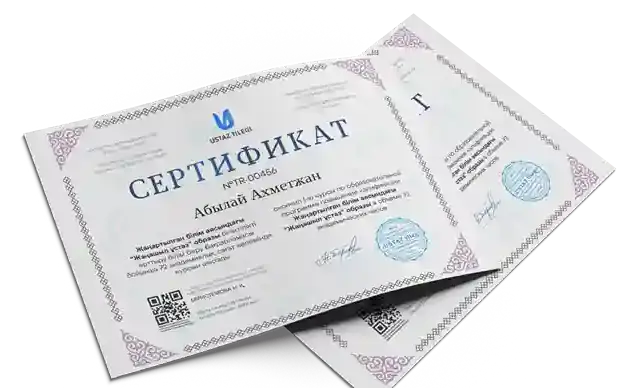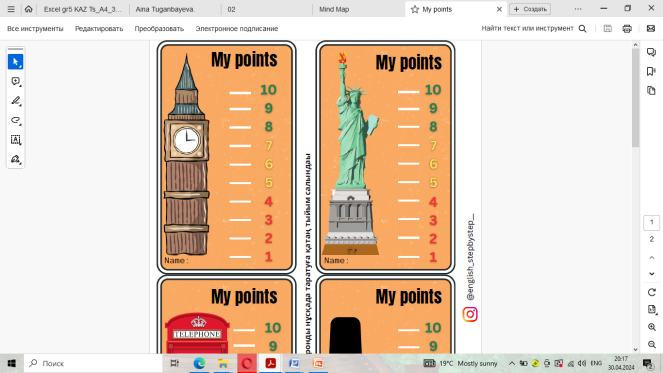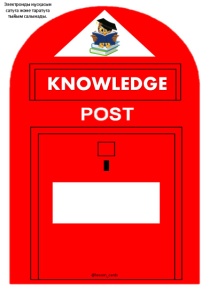Назар аударыңыз. Бұл материалды сайт қолданушысы жариялаған. Егер материал сіздің авторлық құқығыңызды бұзса, осында жазыңыз. Біз ең жылдам уақытта материалды сайттан өшіреміз
Жақын арада сайт әкімшілігі сізбен хабарласады

Бонусты жинап картаңызға (kaspi Gold, Halyk bank) шығарып аласыз


In all weathers. Weather 5th grade, 5сынып ашық сабақ ағылшын
Дипломдар мен сертификаттарды алып үлгеріңіз!


Материалдың толық нұсқасын
жүктеп алып көруге болады
|
School: |
|
|||||
|
Subject: |
English |
|||||
|
Unit 9: |
Holidays |
|||||
|
Teacher name: |
|
|||||
|
Date: |
|
|||||
|
Grade: 5 |
Number present: |
Number absent: |
||||
|
Theme of the lesson: |
In all weathers |
|||||
|
Lеаrnіng objеctіvеs(s) thаt thіs lesson is contributing to: |
5.1.3.1 respect differing points of view; 5.2.3.1 understand an increasing range of unsupported basic questions on general and curricular topics; 5.3.2.1 ask simple questions to get information about a limited range of general topics. |
|||||
|
Lesson objectives |
Learners will be able to: - expand their vocabulary by acquiring words related to seasonal activities; - develop speaking and listening skills by asking and answering questions about the weather |
|||||
|
Аssеssmеnt crіtеrіа: |
Show respect for opinions that differ from one's own.. Ability to infer meaning from context when encountering unfamiliar questions Formulates clear and coherent questions to gather information on familiar general topics. |
|||||
|
Lеvеl of thіnkіng skіlls |
Knowlеdgе аnd comprеhеnsіon Application |
|||||
|
Plan |
||||||
|
Stages/Tіmе |
Teacher’s actions
|
Student’s action |
Assessment |
Resources |
||
|
Beginning 5 min Middle 35 min
|
Organization moment : Greeting. The teacher sets the lesson objectives, letting students know what to anticipate from the lesson. Checking homework. Complete the table Group division. Teacher divides pupils into two groups with numbers 1, 2, 3
Warm-up questions. What is your favourite season, and why? What activities do you like to do when it's sunny outside? What do you do on rainy days? What is your favourite outdoor activity to do in the summer? So, what do you think what’s the topic of our lesson? Today we’ll talk about weather and activities. Self-assessment. Teacher gives a sheet of self-assessment paper for each learner. Pre-teaching vocabulary: skiing – шаңғы тебу camping - поход computer games – компьютер ойындары kitesurfing - кайтсерфинг bowling - боулинг windsurfing – серфингпен айналысу gymnastics - гимнастика swimming - жүзу snowman – аққала Pair work. Fill in: go, play or do. What are these activities in your language? Which of them do you sometimes, usually, never do in summer/winter? F/e: I usually go skiing in the winter. Pre-listening. Draw Ss’ attention to the chart. The teacher explains the pronunciation of "5°C" as "five degrees Celsius." The teacher can also model the pronunciation by saying it clearly and then asking the students to repeat after them. What do you see on the weather chart? Can you guess the temperature in Dublin? What does "freezing cold" mean? What does "boiling hot" weather feel like? While-listening stage. Listening for gist. Listen to the audio and grab the meaning, try to answer for these questions. Pop quiz: What is the audio about? Which cities are mentioned in the audio? What’s the weather like in London? How is the weather in Paris? Listening for specific information. Individual work. The teacher plays the audio for the second time to allow students to listen again and fill in the gaps.
Pair work. The teacher gives a task to work in pairs to create a dialogue similar to the example provided: A: What’s the weather like in Athens today? B: It’s warm and sunny. A: What’s the temperature in Athens today? B: It’s 25ºC. It’s warm. Post-listening stage. Group work. Poster presentation. The teacher assigns each group one of the three cities (Sydney, London, or Tokyo). Their task is to create a mind map depicting the weather conditions described for their assigned city. |
Ss listen attentively to understand what they will be learning and what is expected of them during the lesson Ss look at the board and complete the table with correct sentences. Ss come to the board and choose one card, take their seats according to their numbers Ss answer the questions Ss guess the theme of the lesson Ss write their names and they assess themselves during the lesson Ss read and repeat after the teacher Ss work in pairs and they fill in the missing words. ANSWERS: play computer games, go camping, go kitesurfing, go bowling, do gymnastics, go swimming, make a snowman, play basketball, go windsurfing Ss listen attentively to the teacher's instructions. Repeat after the teacher to practice pronunciation and answer the questions. Ss listen to the audio and answer these questions. Ss work individually listening to the audio and filling in the gaps. Students will practice creating dialogues about weather conditions and temperature Students work in small groups to create mind map about the weather in Sydney, London, and Aktau. They discuss the key elements of the weather description provided and decide how to visually represent them |
At the organization moment T tries to award active Ss. «The praise» method is used to evaluate Ss with phrases like: “Good job! Well done!” T praise active Ss with phrases such as: “Good job! Well done!” “One more time, please”
Descriptor. A learner: writes correctly the word “do” – 1 p. writes correctly the word “go” -1 p. writes correctly the word “play” – 1 p Total: 3 points. Assessment for success. Assessment for success. Self-assessment. Descriptor. A learner: listens to the audio – 1 p. fills in the gaps correctly – 2 p. Total: 3 points. T praise active Ss with phrases such as: “Good job! Well done!” “One more time, please” Descriptor. A learner: Reads the text – 1 p. Creates a comprehensive mind map -1 p. Actively contributes to the collaborative work -1p. presents the work - 1 p. Total: 4 points. |
Interactive white board
Excel Grade 5 Pupils Book Ex 4,p.111
Interactive white board
Whiteboard Pupils Book Pupils Book Ex-5, p.111 https://wordwall.net/resource/72590239/play-go-do-make Pupils Book Ex-7, p.111 Pupils Book Ex-7, p.111 Worksheets https://www.youtube.com/watch?v=AN0Mvko7RS8 Ex-7, p.111 |
||
|
End 5 min |
REFLECTION Knowledge Post is used as a reflection. T asks Ss to stick their envelopes to the Knowledge post.
Teacher collects Students’ self assessment papers.
Hometask. Weather journal. T asks students to keep a weather journal for one week. Have students track the daily temperature for one week in their local area |
Ss fill in the paper that provide constructive feedback necessary for the teacher. Students hand over their assessment sheet.
Ss write down the homework |
T praise active Ss with phrases such as: “Good job! Well done!”
|
|
||





